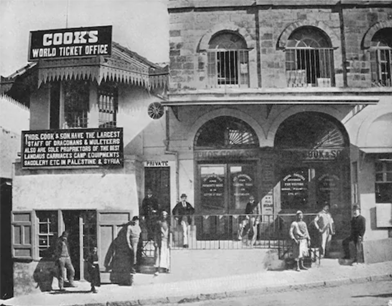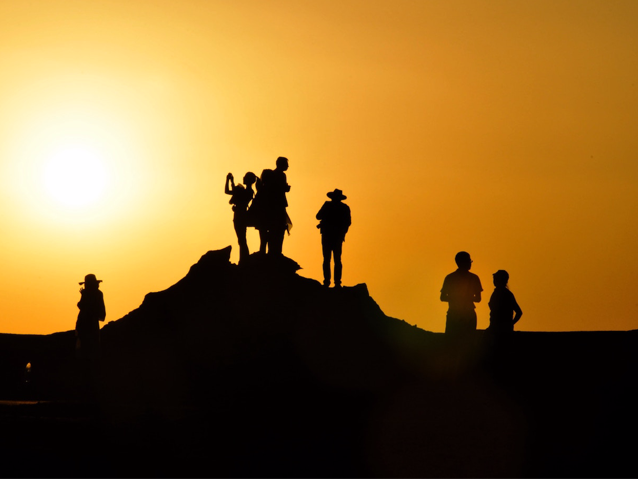Let's begin with a brief history & overview of the role and characteristics of tourism around the globe.
Why?Better understanding of the characteristics of tourism will enable more strategic tourism business decision-making.
Origins of tourism

Travel for leisure purposes has evolved from an experience reserved for a small elite into something enjoyed by many. Historically, the ability to travel was reserved for royalty and the upper classes. From ancient Roman times through to the 17th century, young men of high standing were encouraged to travel through Europe on a "grand tour". Through the Middle Ages, many societies encouraged the practice of religious pilgrimage, as reflected in Chaucer's Canterbury Tales and other literature.
The word hospitality predates the use of the word tourism, and first appeared in the 14th century from the Latin hospes, which encompasses the words guest, host, and foreigner.
The word tourist appeared later and comes from the Latin word tornus - a tool for making a circle. So tourism and tourist represent the activities of circling away from home and then returning.
Tourism as business

Cox & Kings, the first known travel agency, was founded in 1758 when Richard Cox became official travel agent of the British Royal Armed Forces. Almost 100 years later, in June 1841, Thomas Cook opened the first leisure travel agency, designed to help Britons improve their lives by seeing the world and participating in the temperance movement. In 1845, he ran his first commercial packaged tour, complete with cost-effective railway tickets and a printed guide. (Sadly, in 2019, Thomas Cook suddenly collapsed, leaving hundreds of thousands of package tourists stranded.)
The continued popularity of rail travel and the emergence of the automobile presented additional milestones in the development of tourism. In fact, a long journey taken by Karl Benz's wife in 1886 served to kick off interest in car travel and helped to publicize his budding car company, which would one day become Mercedes Benz!
Fast forward to 1952 with the first commercial air flights from London to Colombo. (Yes, Sri Lanka was right there at the dawn of the jet age and the start of the modern tourism industry.)
Since 2000, the industry has seen a massive technological shift as increased internet use revolutionized travel services. Online travel bookings continue to grow exponentially, and by 2014 global leader Expedia had expanded to include brands such as Hotels.com, the Hotwire Group, trivago, and Expedia CruiseShip Centers, earning revenues of over $4.7 million (Expedia Inc., 2013).
Components of tourism
There are five major components of tourism, creating the basis on which any tourism destination is judged. Handily for us, they all happen to begin at the beginning, with the letter A.😀
Tourism's 5 As are:
 Attractions: Everything that, like a magnet, pulls a
tourist towards it. In Sri Lanka, it could be beaches, historic monuments, religious
sites, highland scenery, unique train journeys...
Attractions: Everything that, like a magnet, pulls a
tourist towards it. In Sri Lanka, it could be beaches, historic monuments, religious
sites, highland scenery, unique train journeys...
 Accessibility: How to reach to that place of
attraction: no matter how spectacular or unique a place is, if the traveller can't get
there, it's not a tourist site.
Accessibility: How to reach to that place of
attraction: no matter how spectacular or unique a place is, if the traveller can't get
there, it's not a tourist site.
 Accommodation: Place to stay en route to or at the
tourist attraction.
Accommodation: Place to stay en route to or at the
tourist attraction.
 Amenities: All the other services which we require
while travelling - those many things that make the travel life more comfortable, such as
food, drinking water, toilets, etc.
Amenities: All the other services which we require
while travelling - those many things that make the travel life more comfortable, such as
food, drinking water, toilets, etc.
 Activities: All those things to do at the place of
attraction, whether as active as surfing or as passive as sunbathing, as active as
hiking in nature or as passive as game drives in nature parks...
Activities: All those things to do at the place of
attraction, whether as active as surfing or as passive as sunbathing, as active as
hiking in nature or as passive as game drives in nature parks...
This all seems obvious, right? 🤨
If you offer an activity, provide information about the local attractions in your marketing, together with info on how to get there, where to stay, and what amenities are available. Likewise, if you've a small guesthouse, let potential guests know about all the local attractions and activities on offer, and they're more likely to stay longer at your accommodation.
Tourism characteristics
Most tourism businesses share some key characteristics. Some emphasize one characteristic more than another, but they all play their part in creating tourist experiences and the destinations and services that tourists enjoy - and are therefore happy to pay for.
Here are some important characteristics to keep in mind when planning your tourism business and its marketing - characteristics that make a tourism business so much more complicated (and interesting 😊) than so many other businesses.
Intangibility: it's not a thing you can touch

Though we keep mentioning 'tourism products', tourism is not really a product in the conventional sense: You can't hold it or keep it.
What we're actually selling are experiences.
This concept should influence the ways in which your tourism business markets tours. Why? Because it's how people make their decisions about where to go. What experiences do they want to have while they are there? How do they want to feel? (We'll look at this in a lot more detail in the e-Content course in our lessons on branding.)
Perishability: it doesn't keep

An empty hotel room, an unrented surfboard, an unsold day tour: these are all missed opportunities for a service provider to earn money. Yes, you can try again tomorrow, but you can never get today's missed earnings back.
Seasonality: it's not all good all the time

This one is obvious on the surface: many places will see a drop in tourist numbers when the weather or surf isn't good. Seasonality also leads to outcomes like cutting the number of employees when business is down for the season. But it also has an upside, when managed well: you can schedule your own business improvements when the tourists aren't around. Possibly even take a holiday of your own, assuming you earned enough money during the season to do so.🤞
Interdependence: we're all in this together

Even an all-inclusive company or package tour relies on lots of outside organizations. Transportation, travel, destination, attraction, and accommodation companies and organizations work together to make the tourist industry possible. They all depend on one another to make tourism a profitable industry. For instance, the biggest of hotels and the smallest of homestays all depend on transportation providers (such as airlines and tuktuk drivers) to bring guests to them.
Heterogeneity: same-same but different

A hotel room is just a hotel room, right? Sort of. A room is a room, but a hotel or guesthouse may try to look different to get a competitive edge, or provide a unique service or perk in order to make a sale and fill a room. (We will look at the importance of finding your business's Unique Selling Point and defining your brand personality in the e-Content course.)
Summary
All tourism shares some important characteristics:
- Intangibility: you can't hold tourism in your hand. What we call a product is actually an experience.
- Perishability: an unsold surf lesson is a lost opportunity to make money.
- Seasonality: customers may be more or less likely to go somewhere with changing seasons.
- Interdependence: all sorts of independent companies depend on one another to make a tourist's experience unforgettable.
- Heterogeneity: the tourist industry tries to mix things up in order to offer customers different experiences.
